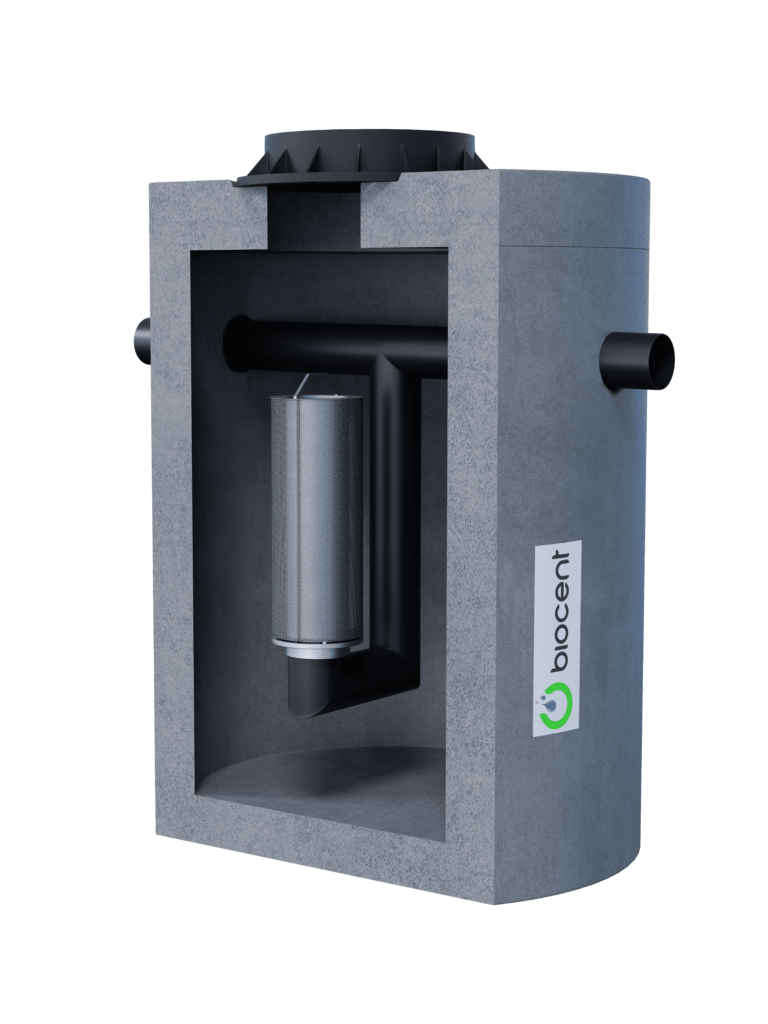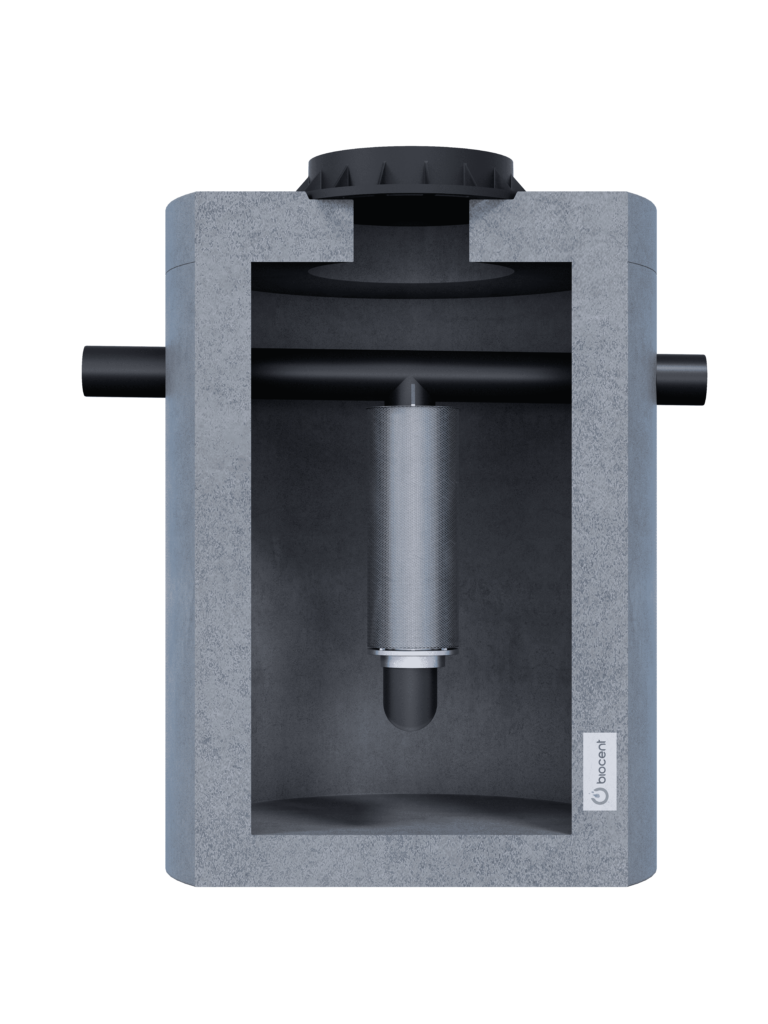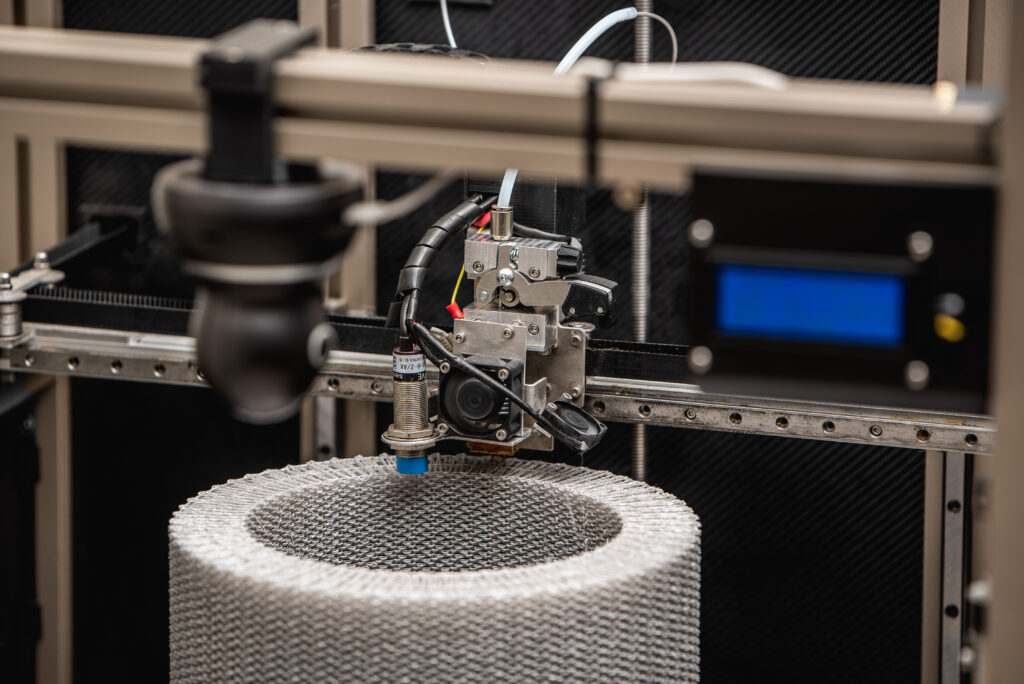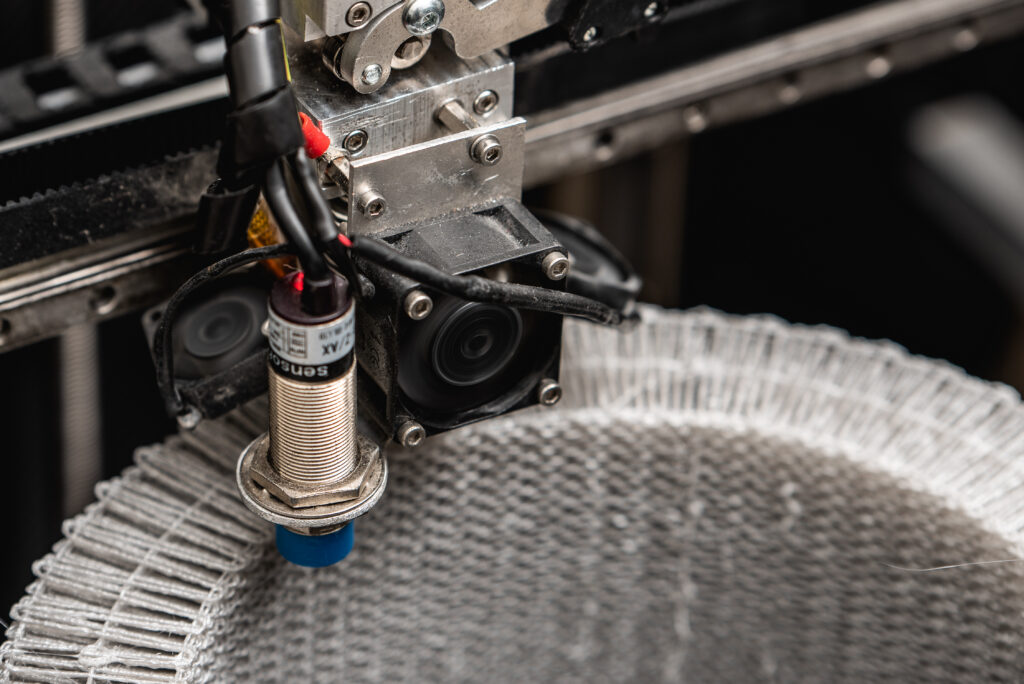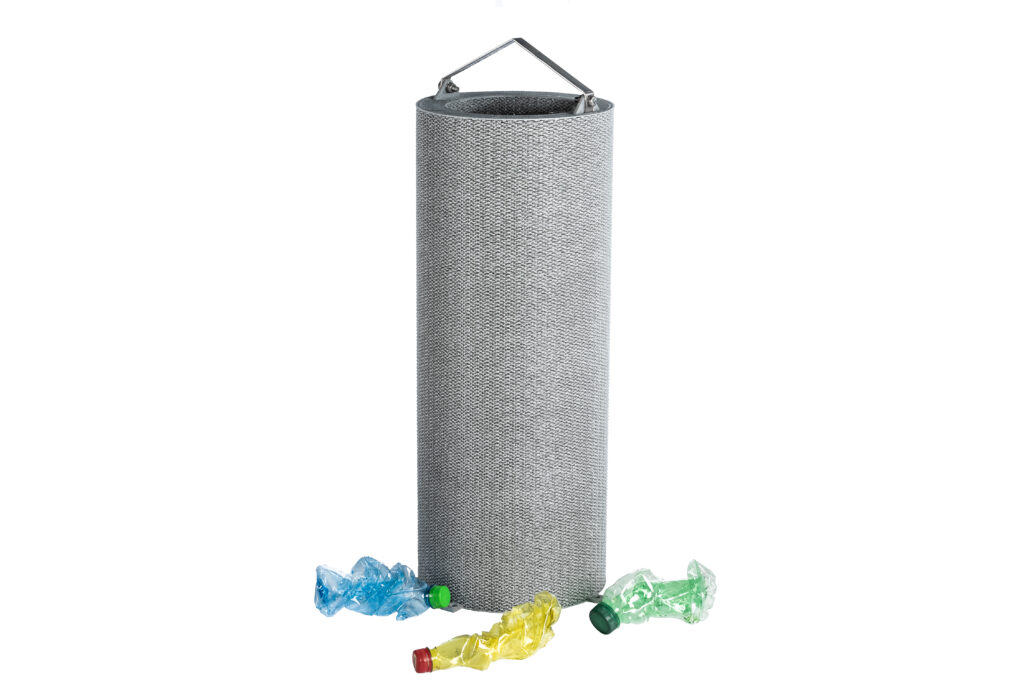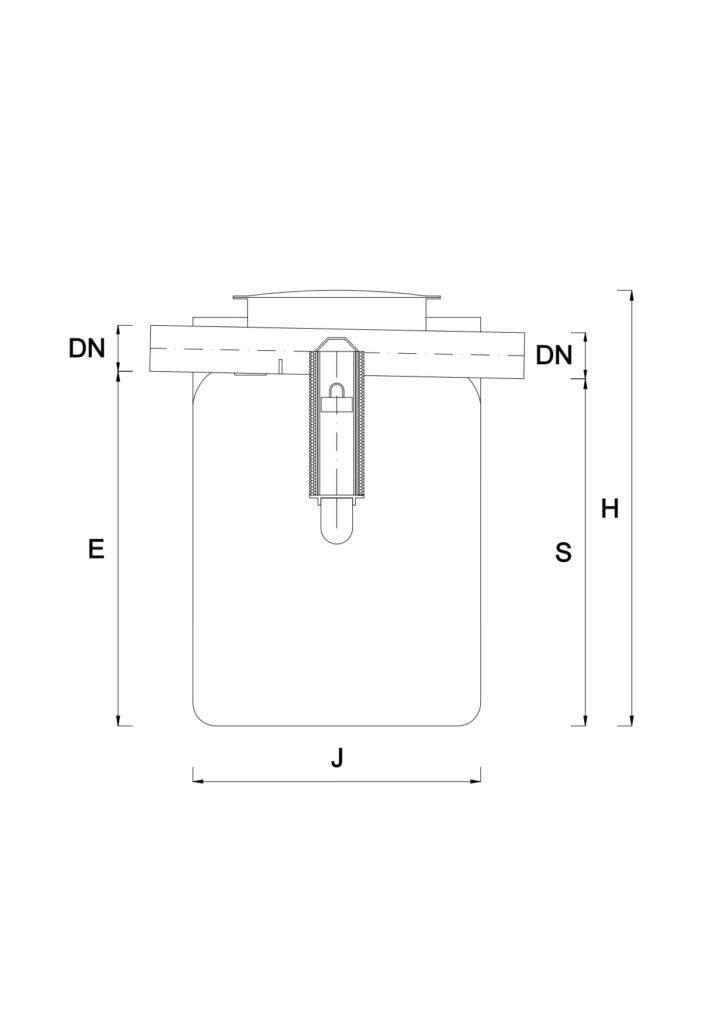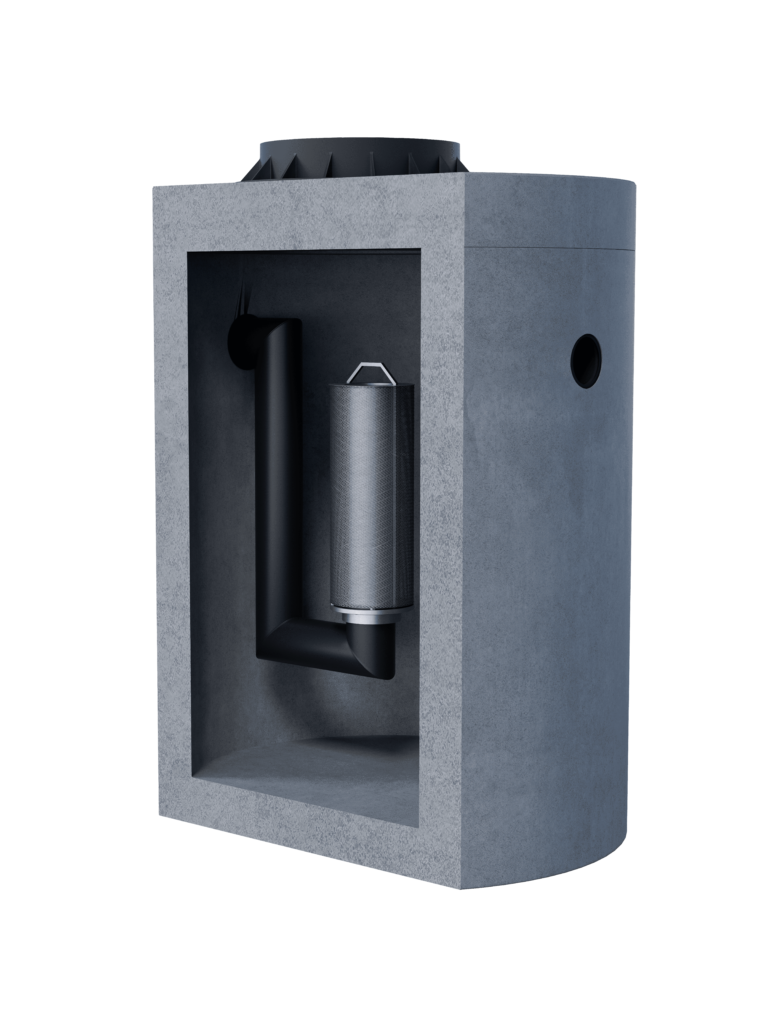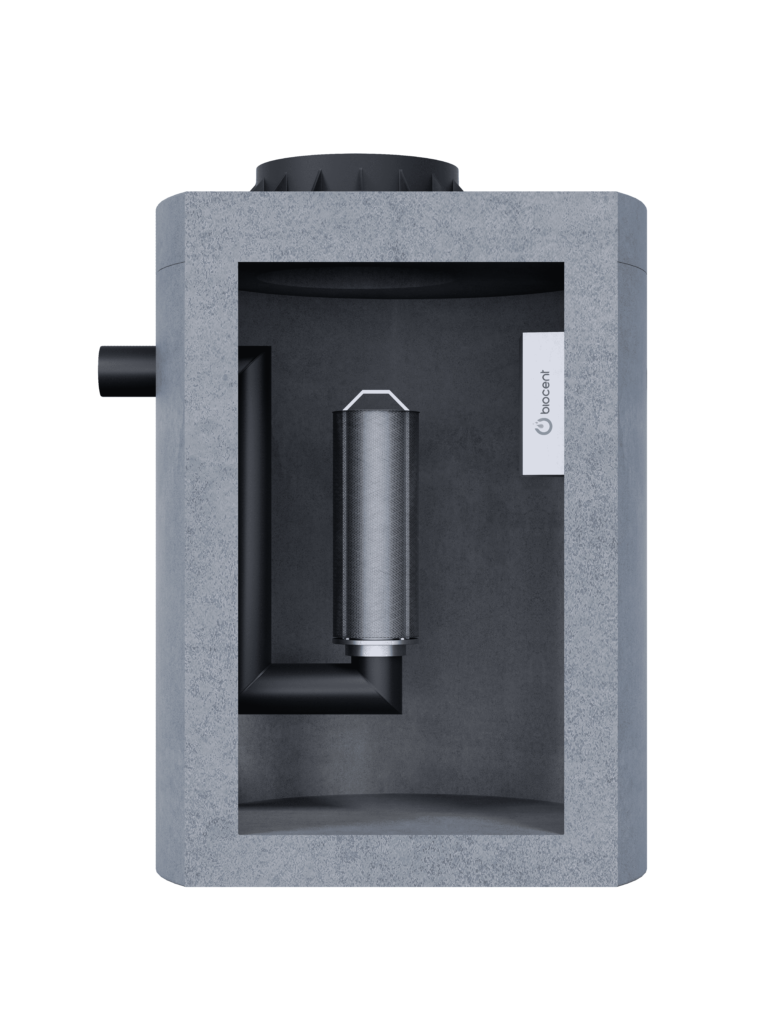Strona główna » Hydrocarbon Separators » Coalescing/lamellar separator Class I according to PN EN 858 integrated with sedimentation and bypass PETRO-OCB/OCBL
Coalescing/lamellar separator Class I according to PN EN 858 integrated with sedimentation and bypass PETRO-OCB/OCBL
Separators compliant with the PN-EN 858-1:2005 standard;
PN-EN 858-1:2005/A1:2007
Coalescing filter (PETRO-OCB) / lamellar (BETROOCBL) and automatic closure preventing the overflow of hydrocarbon substances
Tank body made of minimum class C40/50 reinforced concrete Sulfate-resistant concrete
Concrete permeability: < 5% Concrete tightness: W10 Frost resistance: F 150 10-fold bypass
Separators equipped with D400 cast iron manholes D400 access cover for the separator
Innovative lamellar filter: Specially designed cylindrical lamellae improve the coalescence process and significantly enhance the operation of the separator. Achieving a unique filter shape is possible thanks to the application of 3D printing technology. Filters obtained in this way are characterized by high durability and contribute to environmental protection, as they are made from PET material derived from bottle recycling.
PN-EN 858-2 NS*100s – sewage with a small amount of sewage sludge, e.g., covered gas stations.
| Model | Przepływ Qnom | Przepływ Qmax | Pojemność osadnika | J | I | E | S | H | DN | Pojemność czynna całkowita | Waga najcięższego el. (około) |
| PETRO-OCB/OCBL | [l/s] | [l/s] | [mm] | [mm] | [mm] | [mm] | [mm] | [mm] | [l] | [t] | [t] |
| 3/30/300 | 3 | 30 | 333 | 1300 | 1000 | 900 | 880 | 1650 | 200 | 570 | 2,10 |
| 6/60/600 | 6 | 60 | 631 | 1300 | 1000 | 1600 | 1565 | 2350 | 200 | 1110 | 3,00 |
| 8/80/800 | 8 | 80 | 801 | 1500 | 1200 | 1450 | 1425 | 2250 | 250 | 1440 | 3,45 |
| 10/100/1000 | 10 | 100 | 1083 | 1500 | 1200 | 1850 | 1815 | 2650 | 250 | 1880 | 4,08 |
| 15/150/1500 | 15 | 150 | 1636 | 1800 | 1500 | 1785 | 1755 | 2650 | 315 | 2830 | 5,13 |
| 20/200/2000 | 20 | 200 | 2264 | 2300 | 2000 | 1400 | 1380 | 2350 | 400 | 3860 | 6,24 |
| 30/300/3000 | 30 | 300 | 3019 | 2300 | 2000 | 1900 | 1875 | 2850 | 400 | 5420 | 7,51 |
| 40/400/4000 | 40 | 400 | 4310 | 2800 | 2500 | 1700 | 1680 | 2750 | 500 | 7510 | 7,77 |
| 50/500/5000 | 50 | 500 | 5449 | 2800 | 2500 | 2100 | 2075 | 3150 | 500 | 9449 | 8,75 |
| 60/600/6000 | 60 | 600 | 6040 | 2800 | 2500 | 2400 | 2360 | 3450 | 500 | 10840 | 9,50 |
| 70/700/7000 | 70 | 700 | 7200 | 2800 | 2500 | 2800 | 2775 | 3950 | 600 | 12850 | 10,73 |
PN-EN 858-2 NS*200s – sewage with a moderate amount of sewage sludge, e.g., manual car washes, garage, parking lot runoff, uncovered gas station runoff.
| Model | Przepływ Qnom | Przepływ Qmax | Pojemność osadnika | J | I | E | S | H | DN | Pojemność czynna całkowita | Waga najcięższego el. (około) |
| PETRO-OCB/OCBL | [l/s] | [l/s] | [mm] | [mm] | [mm] | [mm] | [mm] | [mm] | [l] | [t] | [t] |
| 3/30/600 | 3 | 30 | 647 | 1300 | 1000 | 1300 | 1280 | 2050 | 200 | 890 | 2,60 |
| 6/60/1200 | 6 | 60 | 1227 | 1500 | 1200 | 1700 | 1660 | 2450 | 200 | 1710 | 3,76 |
| 8/80/1600 | 8 | 80 | 1604 | 1800 | 1500 | 1450 | 1420 | 2250 | 250 | 2240 | 4,36 |
| 10/100/2000 | 10 | 100 | 2124 | 1800 | 1500 | 1850 | 1805 | 2650 | 250 | 2925 | 5,13 |
| 15/150/3000 | 15 | 150 | 3198 | 2300 | 2000 | 1585 | 1550 | 2450 | 315 | 4395 | 6,50 |
| 20/200/4000 | 20 | 200 | 4034 | 2300 | 2000 | 1900 | 1880 | 2850 | 400 | 5435 | 7,51 |
| 30/300/6000 | 30 | 300 | 6043 | 2800 | 2500 | 1900 | 1870 | 2850 | 400 | 8440 | 8,01 |
| 40/400/8000 | 40 | 400 | 8065 | 2800 | 2500 | 2500 | 2445 | 3450 | 400 | 11265 | 9,50 |
| 50/500/10000 | 50 | 500 | 10278 | 3300 | 3000 | 2300 | 2270 | 3350 | 500 | 14279 | 13,24 |
PN-EN 858-2 NS*300s – sewage with a high amount of sewage sludge, e.g., automatic car washes, truck wash areas, and construction machinery
| Model | Przepływ Qnom | Przepływ Qmax | Pojemność osadnika | J | I | E | S | H | DN | Pojemność czynna całkowita | Waga najcięższego el. (około) |
| PETRO-OCB/OCBL | [l/s] | [l/s] | [mm] | [mm] | [mm] | [mm] | [mm] | [mm] | [l] | [t] | [t] |
| 3/30/900 | 3 | 30 | 924 | 1500 | 1200 | 1200 | 1180 | 1950 | 200 | 1165 | 3,00 |
| 6/60/1800 | 6 | 60 | 1817 | 1800 | 1500 | 1500 | 1450 | 2250 | 200 | 2297 | 4,36 |
| 8/80/2400 | 8 | 80 | 2487 | 1800 | 1500 | 1950 | 1920 | 2750 | 250 | 3128 | 5,33 |
| 10/100/3000 | 10 | 100 | 3111 | 2300 | 2000 | 1450 | 1395 | 2250 | 250 | 3911 | 6,00 |
| 15/150/4500 | 15 | 150 | 4529 | 2300 | 2000 | 1985 | 1950 | 2850 | 315 | 5655 | 7,51 |
| 20/200/6000 | 20 | 200 | 6401 | 2800 | 2500 | 1800 | 1780 | 2750 | 400 | 8001 | 7,77 |
Service
The frequency of emptying the coalescing separator depends on the intensity of incoming sewage. The tank chamber should be regularly emptied, at least twice a year or in case of alarm signaling. After each emptying, it is necessary to refill the separator with water.
Customization
It is also possible to manufacture coalescing separators with or without a sedimentation tank according to an individual project, including: – Made of S235 steel powder-coated or stainless steel AISI 304, AISI 316 – Dimensions adjusted to individual needs.
Proper selection of an oil separator is possible after familiarizing oneself with the specific models available in our offer.
According to the PN-EN 858-1 standard, in combination with oil separators equipped with a bypass, sedimentation tanks should also be equipped with a storm bypass. This results from the definition of the nominal size of the separator (NS), to which the capacity of the sedimentation tank refers, as a dimensionless number corresponding to the maximum flow of sewage in liters per second flowing out of the separator.
If the separator does not have a bypass, the maximum flow through the device should be considered as the nominal size for selecting the sedimentation tank. The value ƒd – the density coefficient of the separated substance – can be simplified by assuming a value of 1.
Predicted sample sewage sludge quantity: Minimum sedimentation tank capacity.
Small (minimum sedimentation tank capacity (L) 100 x NS / ƒd) – technological sewage with a specified small sewage sludge capacity. All areas collecting rainwater, where there is a small amount of mud from street traffic or similar sources, such as drainage basins in the areas of fuel tanks and covered petrol stations.
Medium (minimum sedimentation tank capacity (L) 200 x NS / ƒd) – petrol stations, manual car washes, parts washing, bus washing areas, sewage from garages and parking lots, power plants, mechanical plants.
High (minimum sedimentation tank capacity (L) 300 x NS / ƒd) – vehicle washing facilities for off-road vehicles, construction machinery, agricultural machinery, truck washing areas, automatic car washes such as rotating, drive-through.
Might come in handy - Accessories

DN 65 emptying installation

Sealed hatch for filling BKP

Cast iron hatches class A15-D400

Biocent dla Ciebie
Jeżeli chcesz poznać lepiej Biocent zapisz się do naszego newslettera i bądź na bieżąco.
Masz pytania? Napisz do nas. Chętnie odpowiemy.
Z chęcią przyjmiemy Twoją wiadomość za pośrednictwem naszego formularza kontaktowego lub pocztą e-mail. Skontaktuj się z obsługą klienta Biocent, a odpowiemy najszybciej, jak to możliwe.
Sprawdź nasz FAQ
Poszukaj odpowiedzi w Naszej sekcji FAQ.
